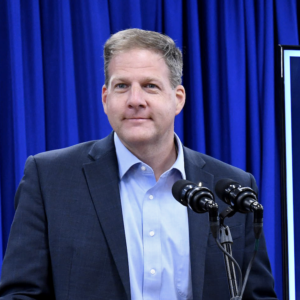Gov. Chris Sununu is happy to debate his support for Education Freedom Accounts, his push to get communities to build more affordable housing, and his problems with the congressional maps drawn by the House GOP majority.
Just don’t call him “John Kasich.”
The New Hampshire Republican has been making news of late by criticizing members of his own party, in particular former President Donald Trump. He has said Republicans in the U.S. Senate are “just as bad” as their Democratic counterparts — a comment quoted by President Joe Biden in his most recent press conference to push the blame for his legislative failures on the GOP.
He has criticized Trump’s suggestion criminals who participated in the January 6 Capitol riot should be pardoned, and he called Trump “misinformed” when he repeatedly claimed (without evidence) New Hampshire’s 2020 election results were in doubt.
But when asked if he is moving into the “John McCain, John Kasich” lane of GOP politics — “The Republican who runs on the fact that he hates Republicans” — Sununu says absolutely not.
“Don’t compare me to John Kasich. John Kasich is an angry guy who goes out of his way to bash his own party. That’s crazy,” Sununu told NHJournal on Wednesday.
As for his critiques of the GOP, Sununu said he was simply upholding a standard he believes leaders of both parties should maintain.
“I’ve expressed frustration, but I didn’t call anyone out by name. Most Americans are frustrated with both parties. Democrats spent four years stonewalling President Trump, and Republicans stonewalling now. And both parties, when they’re in a majority, not reaching out to find consensus.
“I just demand a higher sense of accountability from my fellow elected officials. I think everybody does. I’m not about bashing Republicans, not at all.”
A few hours later, Trump advisor and Granite State GOP strategist Corey Lewandowski told radio host Howie Carr the former president had tasked him with “finding someone to run against Chris Sununu.”
The governor did not respond to requests for comment on Thursday.
Sununu was traveling between Cato Institute appearances in Florida and flying to the island Republic of Cabo Verde for a signing ceremony to officially establish a State Partnership under the National Guard Bureau’s State Partnership Program.
A few days earlier, he met with Canadian ambassador to the U.S. Kirsten Hillman. Asked if he was burnishing his foreign-policy credentials in advance of a 2024 presidential bid, Sununu just laughed.
The New Hampshire governor was in Florida to tout his state’s Cato ranking as the freest state in America. And for Sununu, that also includes the state’s new Education Freedom Account (EFA) program. Democrats spent most of this week pushing legislation to dismantle or restrict EFAs, which allow students to take the state’s share of their public school funding and use it for private, parochial, or other non-public education options.
The program, in its first year, has more than 1,600 participants.
“The EFAs have been a phenomenal success, and folks who are trying to get rid of them are stuck in an antiquated mentality, as opposed to saying ‘the family and the kids come first,” Sununu said. “Everybody sees it as a success, and most importantly those families are seeing the success — especially the lower-income ones. So we’re excited to keep it growing.”
He also had harsh criticism for EFA opponents like state Rep. Marjorie Porter (D-Hillsborough), who recently testified before the House Education Committee that she pulled her own son out of public school and sent him to a private academy. “It was good we had that option,” she said, though she opposes letting low-income families use state funding to do the same.
“That’s exactly the type of hypocrisy we need to get out of government,” Sununu said. “People see right through that. They’re disgusted by it. The ‘good enough for me, but not for thee’ type of mentality.”
Interestingly, education is also part of what Sununu believes is the biggest challenge facing New Hampshire — a lack of housing. Communities are reluctant to allow new housing construction, particularly housing for younger families because they are convinced educating their children will increase property taxes.
Sununu says that’s misguided NIMBYism.
“Just because of demographics, our schools are going to lose three to five percent of kids over the next few years, so it’s not like they’re going to be overrun with children,” Sununu said. In fact, if we can bring in families, it’s just the opposite. The community’s going to grow, you’re going to avoid funding crises. So you want a healthy balance, I get that.
“But this 1990s mentality of fearing young families moving into your community because they’re going to increase costs to your community? That’s old-fashioned thinking that will just lead to bad economics for that town.”




